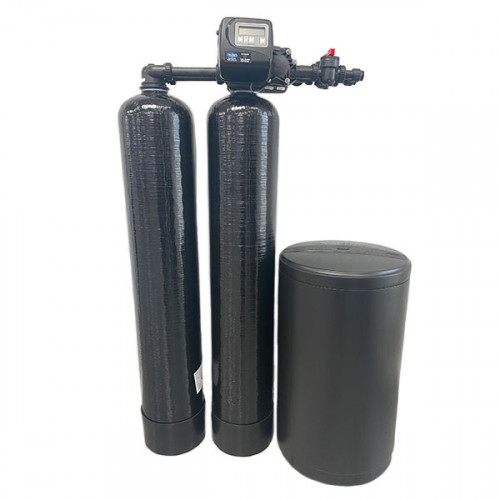How does a water softener work?

A water softener is a device that is used to remove excess minerals, such as calcium and magnesium, from hard water. It works by exchanging the hard minerals with sodium ions through a process called ion exchange. The water softener has a resin tank filled with tiny resin beads. These beads are coated with sodium ions.
When hard water enters the tank, the calcium and magnesium ions in the water are attracted to the resin beads, exchanging places with the sodium ions. The sodium-rich water then flows out of the tank and into your home, providing you with soft water. Over time, the resin beads become saturated with calcium and magnesium ions and must be regenerated. This is done by flushing the tank with a concentrated salt solution, which replaces the hard minerals on the resin beads with sodium ions, restoring the ion exchange process. Water softeners can help to extend the life of appliances and plumbing fixtures, improve the taste and smell of water, and reduce the buildup of soap scum and mineral deposits in showers and baths.
What are the benefits of a water softener?
- Improved water quality: Soft water is free of minerals that can cause staining, scale buildup, and soap scum in sinks, showers, and appliances. Soft water also makes it easier to lather soap and shampoo, and leaves your skin feeling smoother.
- Extended lifespan of appliances: Hard water can cause mineral buildup in appliances, such as dishwashers and washing machines, which can lead to reduced efficiency and lifespan. Soft water can help extend the lifespan of these appliances and save money on repairs or replacements.
- Reduced energy costs: Appliances that operate with soft water require less energy to run, as they do not have to work as hard to heat water or run through mineral buildup. This can result in lower energy bills over time.
- Improved plumbing system: Soft water can help reduce mineral buildup in pipes and plumbing fixtures, which can improve water pressure and prevent leaks and clogs.
- Cost-effective: While installing a water softener may require an initial investment, it can provide long-term savings by reducing the need for cleaning supplies, repairs, and replacements of appliances and plumbing systems.
Overall, a water softener can provide numerous benefits to homeowners by improving water quality, extending the lifespan of appliances and plumbing systems, reducing energy costs, and being a cost-effective solution to hard water problems. Vern Dale Water Experts offers a full line of water softeners. We offer free consultations, including water testing, and show you options that will work for your home or business. Click here to learn more about our water softeners.